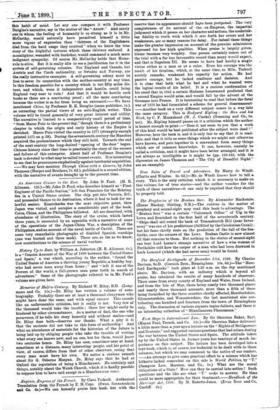IA:genie, Empress of the French. By Clara Tschudi. Authorised Translation
from the French by E. M. Cope. (Swan Sonnenschein and Co. 6s.)—We can honestly praise this book, but with the reserve that its appearance should have been postponed. . The very completeness of its account of .the ex-Empress, the impartial judgment which it passes on her character and actions, the unshrink- ing fidelity to truth with which it sets forth her errors and her weaknesses, are so many reasons for, delay. For indeed these things make the greater impression on account of the genuine admiration expressed for her high qualities. When praise is largely, given, blame becomes very weighty. One person certainly comes out of the trial with a far less favourable record than many would expect, and that is Napoleon III. He seems to have had hardly a single virtue either as a man or as a ruler. Even his courage was the result of his fatalism, which, at the same time, as Mlle. Tschudi acutely remarks, weakened his capacity for action. He had passive courage, but he lacked readiness and decision. And it is clear that both what he had and what he wanted were the logical results of his belief. It is a curious confirmation of his creed that in 1811 a certain Madame Lenormand predicted that a second Empire would arise, and would fall by the advent of the Germans into France. It is interesting to read that before the fatal war of 1870 he had formulated a scheme for general disarmament. —Another book on a very different subject comes in a way into the same category. This is Rudyard Kipling : the Han and his Work, by C. F. Monkshood (W. J. Clarke) (Greening and Co., 6s. net). Mr. Kipling himself passes on it a criticism which the author is honest enough to print :—" Does it not seem to you that a work of this kind would be best published after the subject were dead 1 " However, here the book is, and it is only fair to say that it is read- able, and that it tells us some things which we might not otherwise have known, and puts together in a convenient form many things which are of common knowledge. It can, however, scarcely be called a criticism, and it might have been better arranged, and it is not always as intelligible as it might be (pp. 159-166, with the digression on James Thomson and The City of Dreadful Night" are an example).






































 Previous page
Previous page